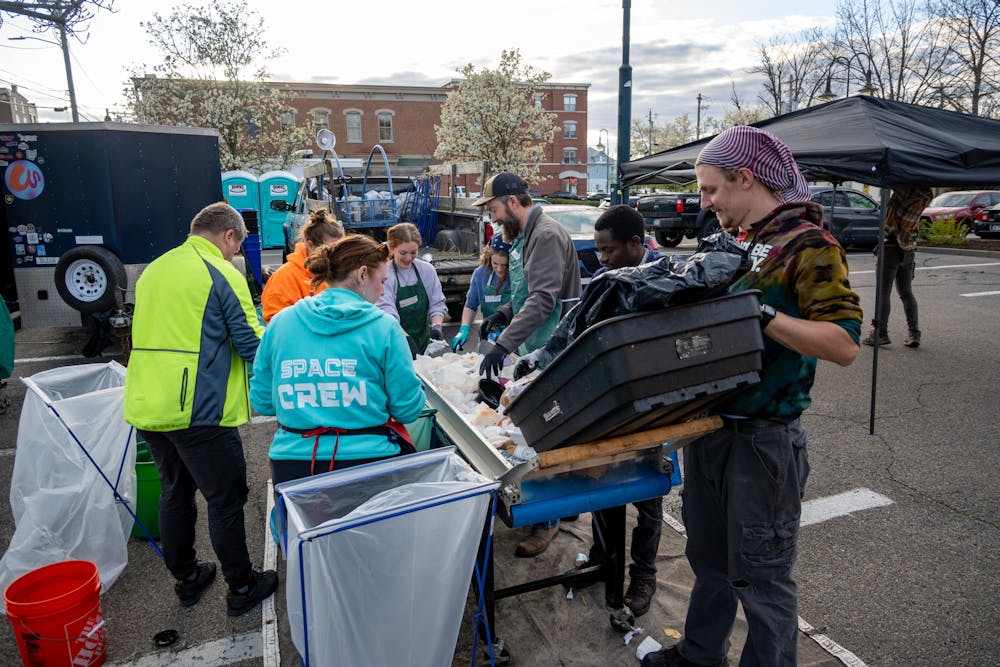Miami University students benefit from a widespread recycling program that is at their fingertips across campus. While the success of proper recycling on campus may not be outstanding, students are not short on options. From small bins in dorm rooms to AI systems helping sort recyclable waste, a waste-conscious student has the tools to make their best effort.
However, most students do not stay on Miami’s campus for four straight years. Oxford is inextricably linked with the lives of students and has similarly put funds and efforts into sustainability initiatives. Oxford Sustainability Coordinator Reena Murphy explained that the city has the most extensive climate plan in southwest Ohio, behind only Cincinnati.
“We are a small community looking to be a regional leader,” Murphy said.
Recycling plays a highly important role in Oxford’s plans to become a sustainable community. Similar to Miami, Oxford has set a date to achieve carbon neutrality, but the city’s plan also includes a goal to become a “zero waste community.” Despite already claiming the highest recycling rate in Butler County, the climate action plan aims to increase the residential diversion rate, or how much waste gets sent to recycling rather than landfills, from 25% to 30% by 2030.
There are a few ways students can see these initiatives happening in their community. After receiving nearly $30,000 from an Ohio EPA grant, the city is producing an educational campaign to increase awareness about what is recyclable, offering in-house recycling bins to student and non-student housing and providing curbside recycling pickup for multi-unit residences.

The city hopes to have student groups manning waste stations in the future. Photo provided by Reena Murphy
Moreover, the many festivals and events held Uptown will now provide multiple sorting waste stations to separate waste into landfills, recycling and composting. If this sounds familiar, it is because a similar system can be found in the Armstrong Student Center. The difference? Oxford waste stations are manned by volunteers, and Armstrong waste stations are manned by artificial intelligence.
Yet, that is the root of the recent recycling initiatives in Oxford. Before the grants and educational promotions, it was local residents volunteering their time to decrease the waste Oxford was producing. The first sorting waste stations were built by Oxford citizens by hand and brought to city events.
“We have a very active community that is willing to advocate for sustainability issues,” Murphy said. “They're willing to put in the work themselves, and they're willing to use their voice in that way.”
This grassroots approach to improving recycling in the community led to the actions taken by the city government. Since then, companies have been hired and official waste stations have been bought using grant money.
Members of Oxford’s Environmental Commission have been bringing these waste stations to events and manning them. Jon Ralinovsky, a piano technician in Miami’s Department of Music and member of the commission, hopes to see the waste stations at more events in the future.
“Eventually we'd like to expand it to any event on city property,” Ralinovsky said. “[Including] out to community parks, whether they [hold] sports tournaments or Fourth of July sort of things, we just like to expand it to have it at every event.”
Enjoy what you're reading?
Signup for our newsletter
During the Solar Eclipse festival in April 2024, Zero Waste Events Production LLC and volunteers placed waste stations around the town and used a conveyor belt to sort waste into recycling and composting by hand. Additional waste stations have been bought for Oxford festivals that will take place throughout the fall semester, including Red Brick Fridays and OXtoberfest.
“It wasn't the city that said we want events to be zero waste, it was the community and city council members, and the city followed suit,” Murphy said. “[They were] willing to literally show up and put in the work and build the first waste stations.”

So far, it has been community volunteers and hired workers who have manned Oxford's waste stations. Photo provided by Reena Murphy
The first instance of the waste stations being used this fall semester was at the Red Brick Friday on Aug. 3oth. Junior psychology and English major John Day, who is also the Secretary for Infrastructure and Sustainability in Miami’s Associated Student Government, noticed some attendees failed to make use of the stations, but has hope for their success in the future.
“Even though they had two stations, two separate locations, [and] they told you where to put your stuff, you'd walk by trash cans and there just be recyclable water bottles,” Day said. “If you can change one small [act on] an individual's part, you can still make a change.”
From the small group of individuals that started making an effort to sort Oxford’s waste, Murphy describes that the city is now trying to “institutionalize” recycling and expand their services and outreach. These will include providing recycling to businesses and increasing student involvement at waste stations Uptown.




